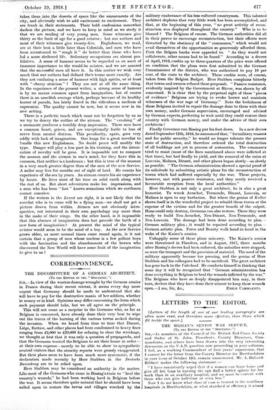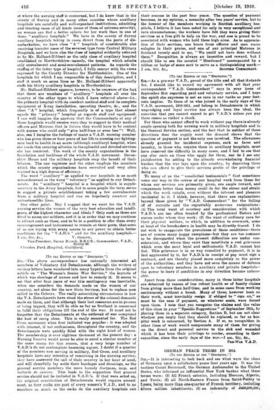LETTERS TO THE EDITOR.
[Letters of the length of one of our leading paragraphs are often more read, and therefore more effective, than those which fill treble the space.]
THE WOMAN'S SENIOR WAR SERVICE.
(To THE EDITOR OF rue " SPECTATOR...I
Sis,—As members of the Council of the British Red Cross Society and Order of St. John, Presidents, County Directors, Com- mandants, and others have been drawn into the very interesting discussion on the V.A.D. question now proceeding in your columns. I feel, as a working Commandant of four years' experience, that I cannot let the letter from the County Director for Ifertfordishire in your issue of October 12th remain unanswered. Mr. A. Holland- Hibbert makes the following statement :—
" I have consistently urged that if a woman can leave home and give all her time to nursing she can find a better sphere for her work than in an auxiliary hospital, and we must be content with those who can give half-time or even less."
Now I do not know what class of case is treated in the auxiliary hospitals in Hertfordshire, or what standard of efficiency is aimed st where the nursing staff is concerned, but I do know that in the county of Surrey and in many other counties where auxiliary hospitals are carefully and well-organized institutions, admitting and treating oases of all kinds (some of them-of extreme severity), no woman can find a better sphere for her work than in one of these "auxiliary hospitals." We have in the county of Surrey auxiliary hospitals taking in cases direct from the ports of dis- embarkation, we have class "A " hospitals of considerable size receiving transfer cases of the severest type from Central Military Hospitals, and we have also the class of hospital evidently referred to by Mr. Holland-Hibbert as the only class of auxiliary hospital established in Hertfordshire—namely, the hospital which admits only oonvaleecent and semi-oonvaleecent patients. As regards the staffing of the latter type of hospital, I fully concur with the views expressed by the County Director for Hertfordshire. One of the hospitals for which I am responsible is of this description, and I staff it much on same lines as Mr. Holland-Hibbert apparently staffs his thirty auxiliary hospitals in Hertfordshire.
Mr. Holland-Hibbert appears, however, to be unaware of the fact that there are numbers of auxiliary " hospitals all over the country of the other types to which I have referred above—i.e., the primary hospital wits► its resident medical staff and its complete equipment of X-ray installation, operating theatre, &c., and the class "A" hospital, which frequently is of a type that almost equals the " primary " hospital as regards staff and equipment. I can well imagine the answers that the Commandants of any of these hospitals would receive were they to suggest to their medical officers and Matrons that in future they would have to be content with nurses who could only " give half-time or even less"! Well, also, can I imagine the feelings of many a V.A.D. nursing member who has given three or four years of her life to nursing our fighting- men back to health in an acute (although auxiliary) hospital, when she reads this sneering allusion to the splendid and devoted services she has rendered. The work of the county organizations is the foundation and backbone of the whole V.A.D. movement. Devon- shire House and the military hospitals reap the benefit of their labours. The one registers and the other employs the members which the county organization have recruited and very often trained to a high degree of efficiency.
The word " auxiliary " as applied to our hospitals is as much misunderstood as the word " voluntary " as applied to our Detach- ments. An " auxiliary " hospital ie a hospital which is supple- mentary to the Army hospitals, but to some people the term seems to suggest a private establishment taking a few convalescents from a military hospital and run on hopelessly amateur and unbusineselike One other point. May I suggest that we want for the V.A.D. nursing service the women of the very beet education and intelli- gence, of the highest character and ideals ? Only such as these are fitted to nurse our soldiers, and it is in order that we may continue to attract such as these, and to be in a position to offer them every encouragement and inducement to remain at their posts, that some of us are trying with every means in our power to obtain better conditions for the " V.A.D.'s " and for the auxiliary hospitals.- Vice-President, Surrey Branch, B.R.C.S.; Commandant, V.A.D., Surrey BC elandon Park Hospital, Guildford.



































 Previous page
Previous page